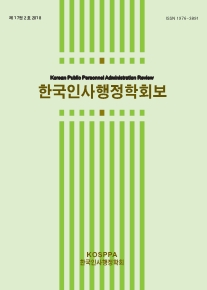본 연구의 목적은 정부 운영에 있어 핵심 제도의 하나인 실적제가 조직효과성에 미치는 영향을 개인적 수준에서 분석하고, 실적제와 조직효과성 사이에서 공공봉사동기의 조절효과를 분석하는데 있다. 이를 위하여 조직효과성을 직무만족, 조직몰입, 직무성과, 혁신행동으로 구분하여 변수간 관계를 분석하였다. 분석 결과, 첫째, 실적제는 조직효과성 즉, 직무만족, 조직몰입, 직무성과, 혁신행동에 유의한 정(+)의 영향을 미치고 있는 것으로 나타났다. 둘째, 실적제와 조직효과성 하위변수들 간 관계에서 공공봉사동기는 실적제와 직무성과간, 실적제와 혁신행동 간 관계에서 유의한 정(+)의 영향을 미치는 것으로 나타났다. 이러한 결과를 바탕으로 연구의 시사점을 논의하였다.
Although its universality in the modern governments, there is still controversy over the effectiveness of the merit system. This article analyzed the effect of the merit system on organizational effectiveness at the individual level, and examined whether public service motivation(PSM) moderates between the merit system and organizational effectiveness. Organizational effectiveness was treated by dividing sub-variables into job satisfaction, organizational commitment, job performance, and innovative work behavior. Analyzing a data of central and local government officials in Korea, this study found that the merit system had a positive effect on job satisfaction, organizational commitment, job performance, and innovative work behavior. Futhermore, the effect of merit system on job performance and innovative work behavior was moderated by PSM. Based on these results, the implications of the study were discussed.
Ⅰ. 실적제는 여전히 유효한가
Ⅱ. 이론적 논의 및 가설 설정
Ⅲ. 연구방법
Ⅳ. 분석 결과
Ⅴ. 연구 요약 및 시사점
참고문헌
(0)
(0)
